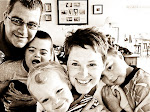I love that commercial that says something like... don't you wish it were easier to spot the good guy..." and you see these ordinary people wearing yellow capes in route no doubt to aid someone in need and ultimately save the day. Super Heroes live among us, I am sure of this, but sometimes they are quite difficult to spot while it would appear that @$$ holes stand up to be counted every chance they get. Along those same lines, I wish that Mean People came with a similar warning system so that you could avoid them without having to play victim to their insensitive ignorance and down right nasty impositions. Wouldn't it be great if you could go to the park or your kid's soccer game and know immediately what kids were going to play nice... and what parents too for that matter?
We have been cooped up in the house for days now with runny noses and overall yuckiness... but everyone is doing a bit better and it was painfully clear that we were all in desperate need of some major doses of vitamin D... ie time in the sun. So we head off to the park for just a bit. Going to the park is always a experiment in human nature. We start by giving Andrew the parameters (ie you can't leave the wood chip area) and he is off like a shot. It is only a matter of time before he hooks up with a "gang" and they embark on some adventure. I try to let Sam interact with other kids as much as possible, letting him choose who he wants to engage and who and what he wants to play with (within reason of course) and I am always surprised by how kids and parents respond to Sam and to our family. There are the parents who use Sam's presence as a chance to educate their child about kindness and diversity. Then there are the parents who up-root their child to an entirely different side of the park as if fearful that Sam could give their child and extra chromosome just by being in close proximity to them. And then there are the kids who aren't quite sure what to make of Sam. I see them watch him and circle him like they are stalking pray. They get closer and closer until they are finally sharing a shovel and bucket in the sand. It all seems well and fine until the child starts kicking sand in Sam's face or poking him with a stick just to see what he will do. I assimilate it to someone poking at roadkill on the side of the road to see if it will move...they know it is dead but they poke it anyway as if this is a completely acceptable opportunity to be cruel with out suffering any ramifications. Now where the hell is that kid's parents??? At this point I step in and say something like his name is Sam... or why don't you help him fill the bucket with sand. Usually the child looks at me like... Lady, there is something wrong with this kid and slowly moves away. But the thing that gets me the most is that usually these kids, the ones that find it difficult to come to terms with a peer with a disability, are much older than you might think. Now I might expect some sand throwing or toy-taking-away or something from a smaller child but these kids, these bullies, are at an age where they should know better. And even worse is when I realize that their parents are sitting right behind us watching the whole scene unfold and they say nothing. Seriously. I have seen Andrew deflect a few children by saying... this is my brother Sam and he doesn't talk but if you keep throwing sand at him he won't stop and I will have to leave so let's go play over here (my that boy is wise beyond his years). And then there are the kids who make a bee line for Sam, intent on getting the WHOLE story. "Hey Lady, what's wrong with him?" "Does he have a syndrome... I know what a syndrome is." "Why can't he talk?" At this points some parents try to discourage their child from asking what they feel are abrupt or inappropriate questions. I try to answer everything they ask... these children are genuinely curious and there is a big difference between curious and mean. And I so want to encourage curious and put and end to mean.
So Summer... ready or not... here we come!








































